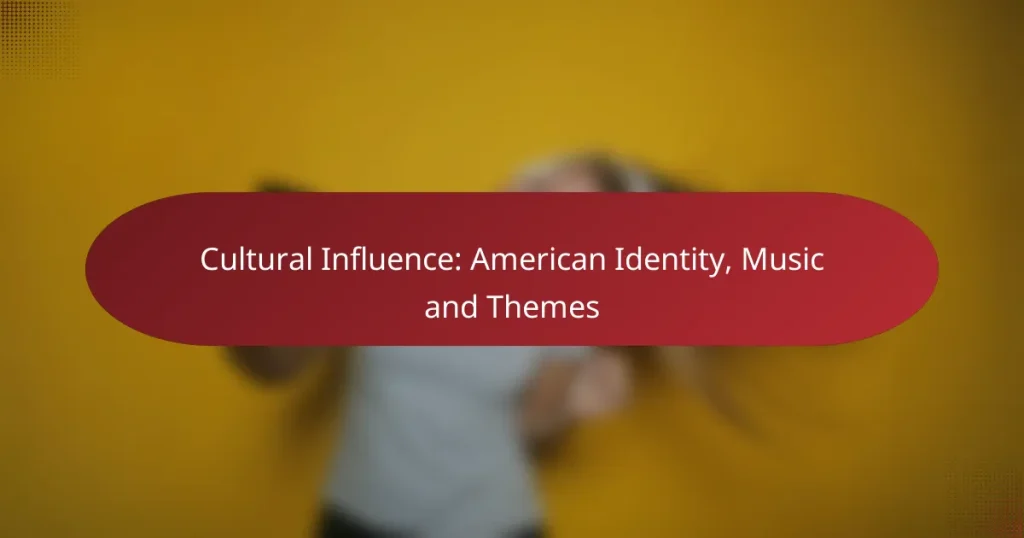
Cultural Influence: American Identity, Music and Themes
American music is a vital expression of cultural identity, encapsulating the diverse experiences and histories…
George W. Bush's music legacy is deeply rooted in his affinity for country music and the vibrant Texas music scene, which mirrors his personal tastes and cultural identity. His presidency not only shaped public perceptions but also intertwined music with significant national events, reflecting the sentiments of the American people during times of crisis and political change.
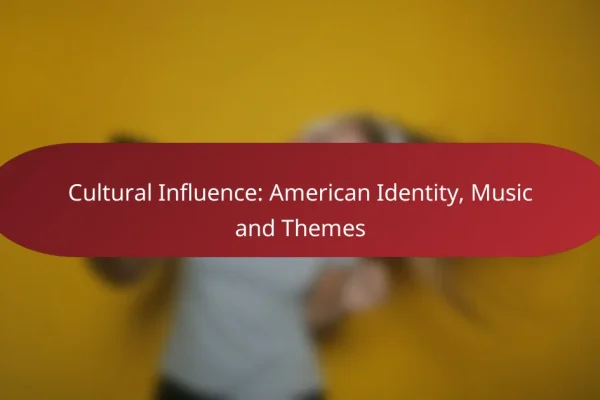
American music is a vital expression of cultural identity, encapsulating the diverse experiences and histories of its people. Through genres such as jazz, hip-hop, and country, it conveys themes of freedom, love, and social justice, fostering a sense of belonging among communities. As a reflection of historical events, music captures the emotions and struggles of…
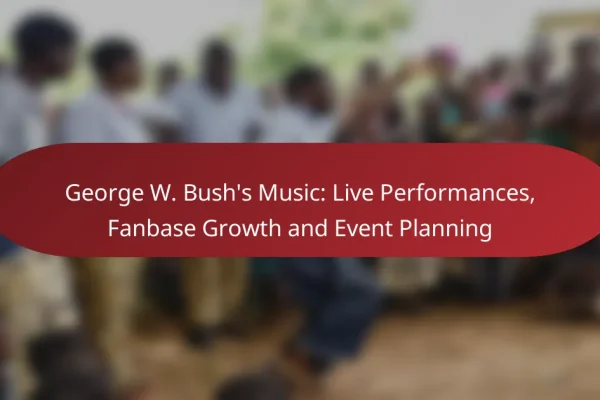
George W. Bush’s music performances have transitioned from local Texas venues to national stages, showcasing his increasing popularity and the blend of his political career with his musical passion. His music not only fosters a sense of community among supporters but also creates a unique connection that transcends politics. Event planning for his performances requires…
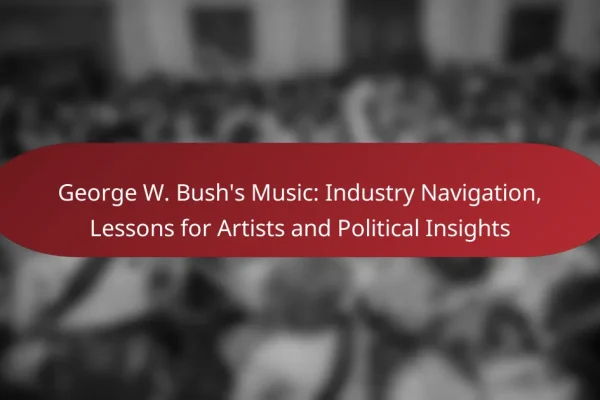
George W. Bush’s navigation of the music industry highlights the powerful intersection of politics and art, where he effectively connected with artists and audiences through strategic collaborations and thematic choices. His journey offers valuable lessons for artists in branding and audience engagement, demonstrating how political insights can enhance one’s musical identity and career. By aligning…
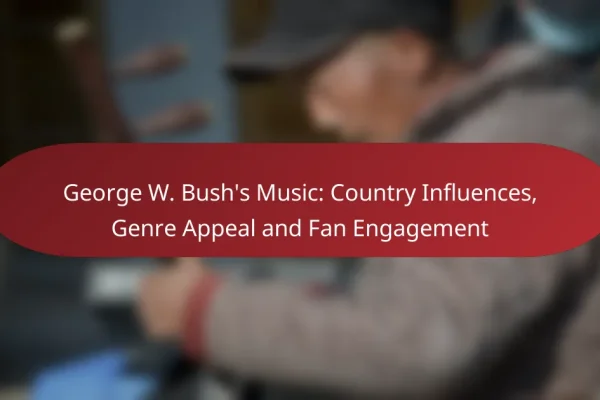
George W. Bush’s music is deeply rooted in country influences, showcasing traditional themes that resonate with his Texas upbringing and personal experiences. His blend of country and rock appeals to fans who value storytelling and patriotism, while engagement through live events and social media fosters a vibrant community around his musical endeavors. How does George…

George W. Bush effectively connects with fans through music by leveraging social media platforms and innovative digital marketing strategies. By sharing announcements, hosting live sessions, and engaging in direct interactions, he fosters a strong sense of community among his followers. His approach includes targeted email campaigns and collaborations with music influencers, ensuring fans feel personally…
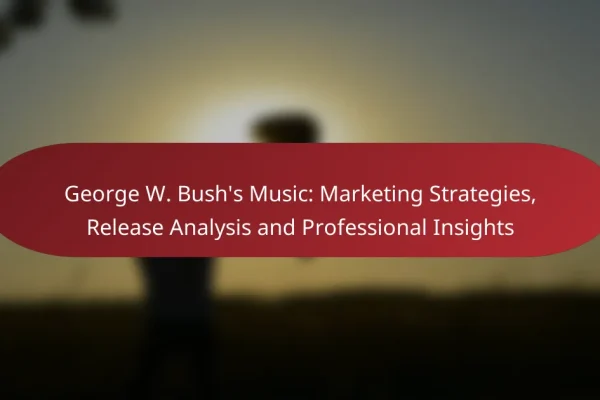
George W. Bush’s foray into music represents a unique intersection of politics and art, employing targeted marketing strategies to enhance his public image. By leveraging his political background and engaging with fans through various platforms, he successfully reshaped perceptions of his persona. Analyzing his musical style and lyrical themes reveals how this artistic endeavor resonates…
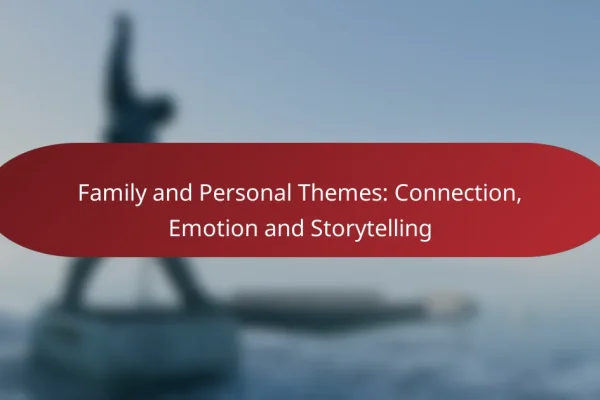
Family storytelling serves as a powerful tool for enhancing connections and emotional intimacy among members. By sharing narratives that reflect their history, values, and emotions, families can create lasting bonds and cherished memories that resonate through generations. Digital platforms further enrich this experience, allowing for collaborative storytelling that preserves these narratives in innovative ways. How…
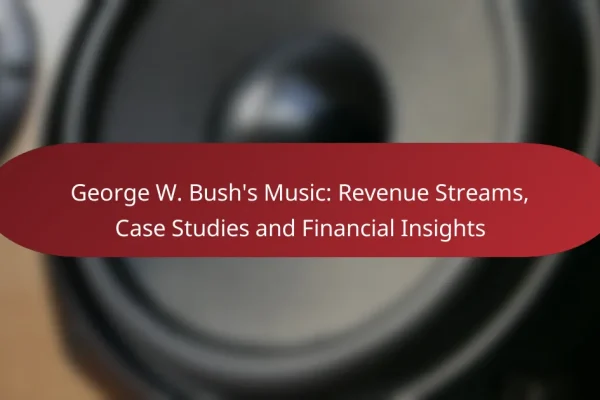
George W. Bush has successfully ventured into the music industry, generating revenue through various streams such as music sales, live performances, and collaborations. His notable case studies, including the release of a country album and partnerships with established artists, reveal the financial implications of his musical pursuits. This intersection of politics and music not only…
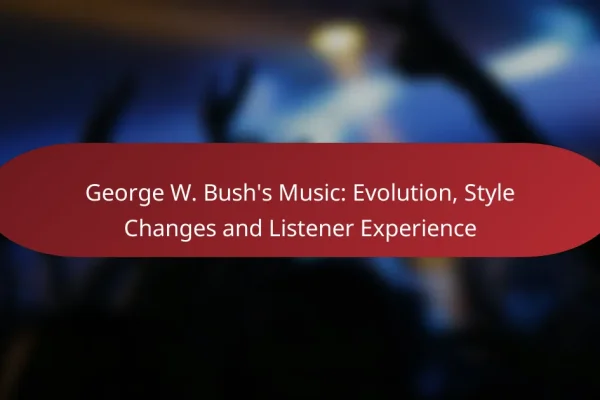
George W. Bush’s music has undergone a notable evolution, mirroring shifts in his personal preferences and the cultural environment. From its country roots, his style has embraced pop influences and patriotic themes, resulting in a rich and varied musical experience that resonates differently with audiences over time. How has George W. Bush’s music evolved over…
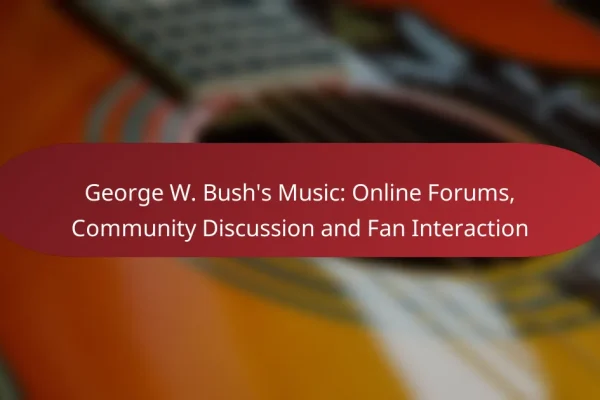
Fans of George W. Bush’s music can connect and engage through various online platforms that encourage community discussion and interaction. These spaces, such as Reddit, Facebook, and Discord, allow enthusiasts to share insights, experiences, and musical preferences, fostering a vibrant community. By joining these music communities, fans gain access to exclusive content and a deeper…
George W. Bush's music legacy is characterized by his strong ties to country music and the Texas music scene, reflecting his personal tastes and cultural background. His influence extends beyond personal enjoyment, impacting the music industry and shaping public perceptions during his presidency.
George W. Bush played a significant role in popularizing country music during his presidency. His public appearances often featured country artists, which helped elevate the genre's profile in mainstream culture.
Artists like Toby Keith and Alan Jackson gained recognition partly due to their connections with Bush, who embraced their music as part of his political persona. This relationship fostered a sense of camaraderie between the country music community and the Republican Party.
Bush's roots in Texas deeply influenced his musical preferences, showcasing a blend of country, blues, and rock. The Texas music scene, known for its rich heritage, resonated with Bush's identity and values.
During his time in office, he often highlighted Texas musicians, promoting local talent and traditions. This connection not only celebrated Texas culture but also reinforced his image as a down-to-earth leader.
Bush's presidential playlists featured a mix of country, rock, and classic American music, reflecting his personal tastes and the cultural landscape of his era. Songs from artists like Willie Nelson and Bruce Springsteen were included, showcasing a diverse range of influences.
These playlists served as a way to connect with the public, often revealing Bush's mood and themes during his presidency. They also provided insight into how music can play a role in political identity and public engagement.
George W. Bush's presidency significantly influenced music by intertwining it with national events and political movements. The music of this era reflected the sentiments of the American public, particularly during times of crisis and political campaigning.
The events of September 11, 2001, profoundly shaped the music landscape in the United States. Artists responded to the tragedy with songs that expressed grief, unity, and resilience, creating a soundtrack for a nation in mourning. Notable tracks like "Where Were You (When the World Stopped Turning)" by Alan Jackson captured the emotional weight of the moment.
In the aftermath, benefit concerts, such as the "Concert for New York City," showcased how music served as a platform for healing and solidarity. These events not only raised funds for victims but also brought together diverse artists to promote a message of hope.
During Bush's presidential campaigns, music played a crucial role in rallying support and energizing crowds. Songs like "God Bless the U.S.A." by Lee Greenwood became synonymous with his political events, reinforcing themes of patriotism and national pride. Campaign rallies often featured live performances, creating an atmosphere of enthusiasm and unity among supporters.
Using music strategically, the Bush campaign capitalized on popular songs to connect emotionally with voters. However, this approach sometimes faced backlash when artists objected to their music being used without permission, highlighting the complexities of music in political contexts.
Music emerged as a powerful political tool during Bush's presidency, shaping public perception and influencing discourse. The administration utilized songs to convey messages and values, while artists responded with protest music that challenged policies, particularly regarding the Iraq War.
Protest songs, such as "American Idiot" by Green Day, resonated with those opposed to the war, illustrating how music can reflect and amplify societal tensions. This dynamic interaction between music and politics underscored the role of artists as commentators on the political landscape, making music an essential element of civic engagement during this period.
Several songs are closely linked to George W. Bush, often reflecting themes of patriotism and resilience. These tracks became anthems during his presidency, resonating with the American public in times of national significance.
This song, performed by Toby Keith, emerged as a powerful patriotic anthem during Bush's presidency, especially after the events of September 11, 2001. The lyrics emphasize themes of American pride and strength, aligning with the national sentiment at the time.
Keith's song was frequently played at political rallies and events, reinforcing its association with Bush's administration and the broader patriotic movement in the early 2000s.
Lee Greenwood's "God Bless the USA" is another significant song connected to George W. Bush. This track gained renewed popularity during his presidency, particularly following national tragedies, as it embodies a spirit of hope and unity.
Often performed at public events, this song became a staple in celebrations of American resilience, further solidifying its place in the cultural landscape of the era.
In addition to the aforementioned songs, other tracks like "Born in the USA" by Bruce Springsteen and "American Soldier" by Toby Keith also gained traction during Bush's presidency. These songs reflect various aspects of American identity and military service, resonating with the public's sentiments during that time.
While not directly associated with Bush, these songs contributed to the broader musical narrative of patriotism and national pride that characterized his administration.
George W. Bush played a significant role in promoting music education through various initiatives and policies during his presidency. His administration emphasized the importance of arts education, including music, as a vital component of a well-rounded education for students across the United States.
During his presidency, Bush's administration launched several initiatives aimed at enhancing music programs in schools. One notable effort was the "No Child Left Behind" Act, which encouraged schools to integrate music and arts into their curricula. This legislation aimed to improve educational outcomes by ensuring that music education was accessible to all students.
Additionally, the President's Committee on the Arts and Humanities worked to promote music education through partnerships with local organizations. These collaborations often provided resources and support for music programs in underserved communities, helping to foster a love for music among young learners.
Bush's administration advocated for increased funding for arts education, including music programs, through various federal grants and initiatives. The National Endowment for the Arts received support to fund projects that aimed to enhance music education in schools, ensuring that students had access to quality instruction and resources.
Moreover, the administration encouraged state and local governments to prioritize arts funding, recognizing the positive impact of music education on student engagement and achievement. This support helped to create a more robust framework for music education across the country, benefiting countless students and educators.
George W. Bush's music legacy is marked by significant collaborations that reflect his personal connections to artists and the cultural landscape of his presidency. Notably, his partnership with country music stars and various artists has shaped his musical influence and public persona.
One of the most prominent collaborations in Bush's music legacy is with Toby Keith, a leading figure in country music. Keith's song "Courtesy of the Red, White and Blue (The Angry American)" became an anthem during Bush's presidency, resonating with patriotic sentiments following the September 11 attacks. This partnership highlighted the intersection of politics and music, as Keith's lyrics often aligned with Bush's messaging on national pride and military support.
Keith's support for Bush was evident during various events, including fundraisers and public appearances, where the two shared a mutual admiration. This collaboration not only solidified Keith's status in the country music scene but also reinforced Bush's connection to American values through music.
Beyond Toby Keith, Bush engaged with a variety of artists across genres, reflecting the diverse musical landscape of his time. Collaborations with musicians like Kid Rock and Lee Ann Womack showcased his appeal to a broad audience, blending country with rock influences. These partnerships often took place at events such as the annual Kennedy Center Honors, where Bush celebrated artistic achievements while promoting unity through music.
Additionally, Bush's administration hosted concerts featuring various artists, creating opportunities for musicians to connect with political themes. These events often emphasized messages of hope and resilience, aligning with Bush's vision for America during challenging times. Such partnerships not only enriched the cultural dialogue but also allowed artists to express their views on national issues through their work.
George W. Bush's music legacy is viewed with a mix of nostalgia and critique, reflecting his personal tastes and the cultural context of his presidency. While some appreciate his selections for their Americana roots, others question their relevance and depth in the broader music landscape.
Public opinion on George W. Bush's musical choices often highlights his affinity for country and classic rock, genres that resonate with many Americans. Songs by artists like Toby Keith and Bruce Springsteen were frequently associated with his presidency, showcasing a blend of patriotism and personal preference.
Many supporters feel that his musical tastes represent traditional American values, while critics argue that his choices lack diversity and fail to reflect the evolving music scene. This divide illustrates how music can symbolize broader cultural and political sentiments.
The music industry has offered mixed critiques of Bush's musical legacy, often focusing on the perceived disconnect between his personal tastes and contemporary trends. Some musicians have expressed disappointment that his selections did not include a wider array of genres or artists, which could have fostered a more inclusive cultural dialogue.
Additionally, certain artists have openly criticized his administration's policies, suggesting that his musical preferences do not align with the values they advocate. This tension highlights the complex relationship between politics and music, where personal choices can evoke significant public response.